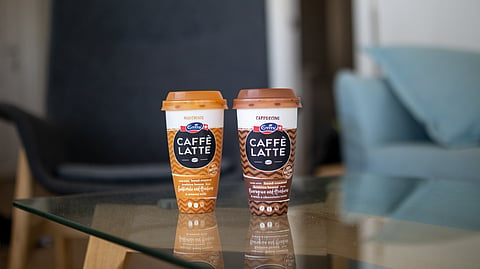
- Home
- EventsEvents
- Product Launches
- CategoriesCategories
- Advertise
- Opinion

Photo - Emmi
Emmi CAFFÈ LATTE, one of the leading ready-to-drink iced coffee brands in Europe, has started to incorporate chemically recycled polypropylene into its packaging. The cups are produced by Greiner Packaging, and the chemically recycled material comes from Borealis, one of the world's leading providers of advanced and circular polyolefin solutions based in Vienna, Austria.
Emmi, Switzerland's largest milk processor, is committed to climate protection and the circular economy. The dairy company has the goal of making all of its packaging 100% recyclable and is committed to various measures to promote circularity, such as packaging that contains at least 30% recyclate by 2027. Focusing on recyclable packaging and the use of recycled materials, Emmi is taking the first step with its successful Emmi CAFFÈ LATTE brand.
Material scarcity and environmental policy
From September 2021, Emmi's successful brand of chilled coffee drinks, Emmi CAFFÈ LATTE, will use at least 100 tonnes of plastic based on the recycled material each year. Chemical recycling renews plastic back to plastic, creating recycled materials with a purity level equivalent to fossil-fuel-based PP. Hence, fit for protective, food-safe, and other demanding applications. In this way, Emmi utilizes difficult to recycle feedstock, preventing plastic waste that would likely be landfilled or incinerated. In the future, depending on the availability of suitable material, the amount of recycled plastic in Emmi CAFFÈ LATTE packaging will be further increased.
The new technology to recover polypropylene is still in its infancy, where Greiner Packaging and Borealis are leading the way. Only limited quantities of chemically recycled polypropylene are currently available, and Emmi is one of only a few food manufacturers to have secured a share of the chemically recycled polypropylene plastic through its early commitment and long-standing collaboration with the development companies.
"It takes joint efforts by food and packaging manufacturers to reduce waste and make measurable progress in the circular economy," says Bendicht Zaugg, who is responsible for Sustainable Packaging at Emmi.
"We have had a long and rewarding partnership with both Emmi and Borealis," says Greiner Packaging key account manager Vincenzo Crescenza. "This achievement is in line with our stated goal to work towards achieving a circular economy. Our strategy is to develop innovative products, develop new service partnerships and business models, and pioneer materials partnerships."
"Borealis looks forward to a world without plastic waste," says Trevor Davis, head of Marketing, Consumer Products at Borealis. "The chemically recycled polypropylene used in this new Emmi CAFFÈ LATTE cup is manufactured with Borealis portfolio of transformational chemical recycling solutions, giving polyolefin-based, post-consumer waste another life. It offers all-round benefits enabling the transition to a circular polyolefin industry whilst creating virgin quality plastic products. By staying true to our ambition of accelerating action on circularity, together with our valuable partners along the whole value chain such as Emmi and Greiner Packaging, we are reinventing for a more sustainable living."
The chemically recycled material used for Emmi CAFFÈ LATTE cup consists entirely and solely of ISCC (International Sustainability & Carbon Certification) material on a mass balance basis. Mass balance is a methodology that makes it possible to track the amount and sustainability characteristics of circular and bio-based content in the value chain and through each process step. This ultimately provides transparency to the consumers, enabling them to know that the product they are buying is based on this renewable material.
Chemically recycled polypropylene
Recovering plastic from plastic packaging: Chemical recycling enables chemical raw materials to be recovered from plastic waste that is otherwise difficult to recycle mechanically – an essential part of the solution for increasing recycling rates and for preventing plastic waste from being landfilled or incinerated and thus keeping it in the cycle as a raw material. These materials have the same properties as plastics from traditional production ("virgin plastics") and are approved for use with food.
